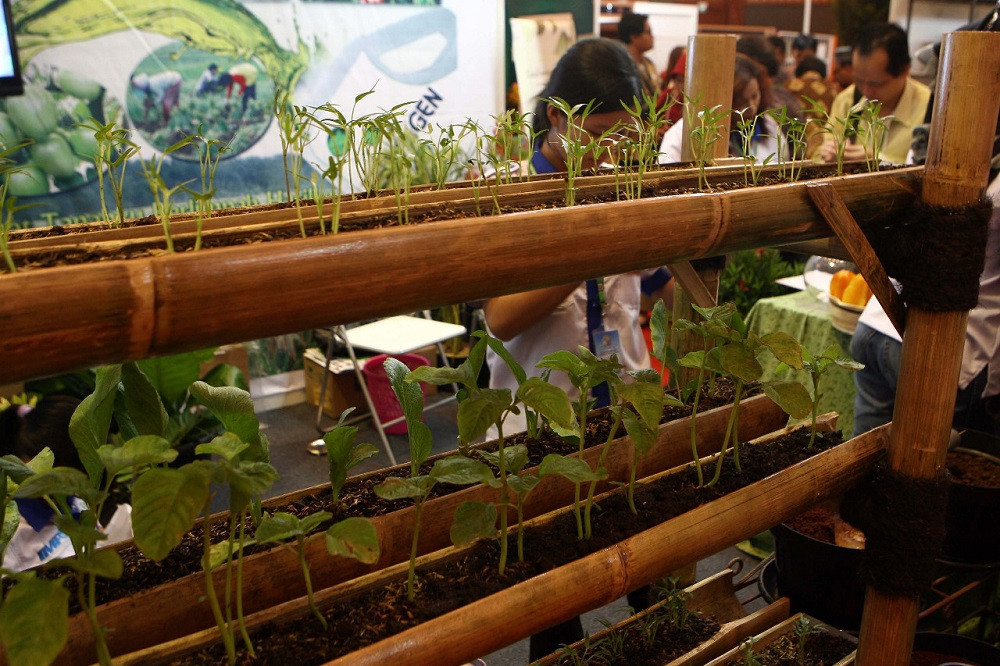Agriculture 4.0: How to ensure just, sustainable agricultural system
Smart farming might replace farmers’ local knowledge and experience, thereby eliminating their role in innovation processes.
Change Size

I
ndonesia, through the Agriculture Ministry, has been promoting Agriculture 4.0 to transform traditional agriculture to a more modern one, to increase the productivity, efficiency and sustainability of food production.
Agriculture 4.0 comprises concepts such as circular agriculture, vertical farming, digital agriculture and aquaponics, potentially using disruptive technology including robotics and sensors connected to precision farming technology, drones, internet of things (IoT), artificial intelligence, machine learning and blockchain, among other methods.
Since 2012, many agritech start-ups in Indonesia — such as TaniHub, 8Villages and BIOPS just to name a few — have been contributing to creating on-the-ground solutions for farmers, using digital platforms to address problems of financing and long supply chains, and introduce farmers to precision farming.
Studies show that in the Indonesian context, Agriculture 4.0 offers the potential to increase the efficiency and productivity of Indonesian agricultural systems and attract private/public investments and young people to pursue farming. However, there are concerns among agricultural practitioners about responsible innovation as there is a tendency to use technology without fully understanding its context and potential social implications in wider society.
What would be needed to ensure inclusion for farmers across Indonesia? Is Agriculture 4.0 the way to increase productivity, and will it be as sustainable as it promises?
According to the Food and Agriculture Organization report in 2019, there are several conditions necessary to enable a digital transformation, including affordability, farmer’s education, supportive policies and programs, basic IT infrastructure and digital literacy. Successful adoption of new technology would require much more than just “copy-pasting”, as Agriculture 4.0 is not a one-size-fits-all solution.
Here we propose several factors to be considered by the government and proponents of Agriculture 4.0 according to the Indonesian context in order to avoid merely following the world trend in the fourth agricultural revolution.
In 1970, when the Green Revolution (Agriculture 3.0) was introduced in Indonesia, farmers were forced to use new and “improved” rice seeds which required high inputs of fertilizer and pesticides and to adopt mechanization. While the Green Revolution has greatly increased food production for a period of time, it has also led to the depletion of soil and water, eroded (local/traditional) plant genetic diversity, and driven farmers’ dependency on external inputs.
Agriculture 4.0 should be a step forward from the unsustainable Agriculture 3.0. If we were to learn from the past, repeating the forceful introduction of this new technology without considering the context and social implications is undesirable. For example, a study conducted by social analysis center AKATIGA (2015) shows that implementing Agriculture 3.0 technology produces trade-offs between production and employment opportunities and income distribution.
The use of a combine harvester that employs a maximum of seven workers per hectare replaces around 30 workers for manual harvesting, reducing employment opportunities, particularly for women. This may be detrimental for social capital implemented through exchange household labor, an asset for effective functioning of small-scale agricultural systems.
A concentration of capital among people who own these machines threatens an even distribution of profits. Moreover, machine harvesting resulted in easily damaged rice with shorter shelf life compared to the traditional manual method of threshing the rice.
Irresponsible mechanization/technology innovation will weaken the social efficiency of traditional and small-scale agriculture. A system is argued to be the most efficient from social perspectives (social efficiency) when it fulfills the following conditions: promotes enhanced production, optimizes employment rate, provides livelihoods, improves income distribution and supports environmental sustainability.
AKATIGA’s study shows that providing a combine harvester with a singular focus on production without considering the village context and existing agricultural system will disrupt social efficiency. Apart from contextual consideration, technological innovation should be responsible and address the specific needs of farmers, meaning that the participation and aspiration of farmers must be prioritized as a basis of development and design.
It will be challenging yet necessary to contextualize the technology for different regions, diverse crops species and varieties, especially if we were to promote the use of traditional varieties instead of the limited few that is currently used as a result of the Green Revolution.
In addition, technology and automatization in Agriculture 4.0 may drive farmers’ dependency on the apps, just like how they were driven to be dependent on external inputs through the introduction of Agriculture 3.0.
Smart farming might replace farmers’ local knowledge and experience, thereby eliminating their role in innovation processes. How does farming remain meaningful for farmers when the apps/technology do all the analyses and farmers only need to follow the app commands?
While the implementation of Agriculture 4.0, especially through digital platforms appears to empower farmers, currently there are limited studies that assess its impacts on agricultural societies and the food system. We have been through several technology revolutions, it is important to avoid repeating the past mistakes. This means, adapting the technology so that it is relevant in our unique context:
the current problems in our agricultural system (degraded soil, eroded genetic diversity, pest and diseases, climate change, dependency on agricultural inputs, farmers’ welfare, land tenure and so on),
the availability of resources (land/soil, agrobiodiversity, human resources, farmers’ knowledge and farm endowment) and the (traditional) farming practices as part of the local identity that define the value of food, not as a mere commodity but as a social good.
We encourage policymakers, funders, agritech companies and researchers to ensure the responsible utilization of Agriculture 4.0, with farmers being at the core of agricultural development. This time, it should not be a forceful introduction with a singular focus on productivity and/or long supply chain but a joint-effort among us to codesign the transition pathway toward just, integrated and sustainable agricultural systems.
***
Stella Dimitri Juventia is PhD student at Farming Systems Ecology Group, Wageningen University, the Netherlands. Nofalia Nurfitriani and Aprilia Ambarwati are researchers at AKATIGA Center for social analysis, Bandung, Indonesia.









